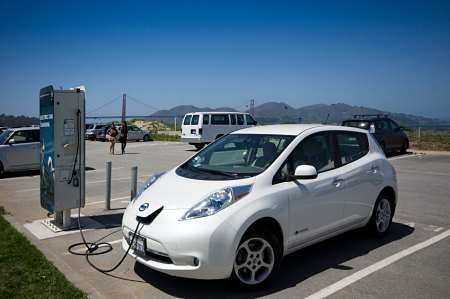Michigan lawmakers introduce clean vehicle legislation
Last month, U.S. Congresswoman Debbie Dingell (D-MI) and U.S. Senator Gary Peters (D-MI) announced new legislation, the Vehicle Innovation Act (VIA) that was introduced in the House of Representatives.
The bill will promote investments in research and development of clean vehicle technologies to create more fuel-efficient vehicles, reduce our nation’s dependence on foreign oil and support American auto manufacturers and suppliers.
“Our nation’s vehicle suppliers and manufacturers have made major advances in cutting-edge fuel efficiency technologies in the last decade, and we need to keep that progress going,” said Congresswoman Dingell. “The Vehicle Innovation Act will build on successful research programs that have resulted in large savings for consumers at the pump and keep the U.S. and Southeast Michigan in the lead in developing high-tech, energy efficient vehicles. I am proud to work with Senator Peters on this critical legislation that will ensure Michigan continues to drive the future in advanced vehicle technology.”
“American auto manufacturers rely on emerging technologies and innovations to continue to grow and compete in the global economy, and we must make critical investments to develop and build those technologies here at home,” said Senator Peters. “This legislation will provide sustainable funding to promote research and development of new vehicle innovations that will make the cars and trucks of the future cleaner, safer and more efficient. I’m honored to work with Congresswoman Dingell to ensure that our manufacturing industry has the resources to continue making important advances in manufacturing that will create jobs and grow our economy.”
The Vehicle Innovation Act reauthorizes the Department of Energy’s Vehicle Technologies Program, which works with light duty automobile and medium and heavy duty commercial truck manufacturers and suppliers to conduct research and development to improve fuel efficiency in vehicles. Examples of these technologies include mild hybrid, engine down speeding, power pack modeling and testing, advanced boosting systems, new vehicle sensing and communication, hydrogen and natural gas refueling and electric vehicle charging technology.
In addition, the bill includes provisions to encourage the development and use of vehicle-to-vehicle (V2V) communications systems that have the potential to improve fuel efficiency and reduce traffic accidents and congestion.
“For the work truck industry to compete globally and continue to meet the needs of vocational truck users, it will need to employ advanced technologies and deploy more alternatively fueled trucks,” said Steve Carey, Executive Director of the National Truck Equipment Association (NTEA). “The Vehicle Innovation Act will support continued public-private partnerships and drive research that will keep us competitive and help us get more fuel efficient trucks on the road and support good paying jobs in Michigan.”
“The Vehicle Innovation Act encourages public-private partnerships that help motor vehicle parts suppliers and manufacturers spur innovation and develop new vehicle technologies,” said Steve Handschuh, president and chief executive officer of the Motor & Equipment Manufacturers Association. “This research and development will help vehicle manufacturers create new technologies to meet future fuel efficiency and emissions requirements while supporting middle class jobs in Michigan. These updates are crucial for maintaining America’s – and Michigan’s – position as a leader in automotive manufacturing, and I thank Congresswoman Dingell and Senator Peters for their leadership of this effort.”
Peters introduced the legislation in the Senate earlier this year with Republican Senator Lamar Alexander (TN) and Senator Debbie Stabenow (MI). The legislation passed the Senate Energy and Natural Resources Committee with overwhelming bipartisan support as part of a larger package of energy legislation.
The legislation is also supported by a broad coalition of environmental groups and manufacturers including the Motor and Equipment Manufacturers Association (MEMA), the BlueGreen Alliance, the Auto Alliance, NTEA, the United Auto Workers, the League of Conservation Voters, the Union of Concerned Scientists, the Natural Resources Defense Council, the Sierra Club, the American Automotive Policy Council, the Electric Drive Transportation Association, Robert Bosch LLC, the LORD Corporation, Umicore, Bergstrom, Magna International, Inc., and Dorman Products, Inc.






